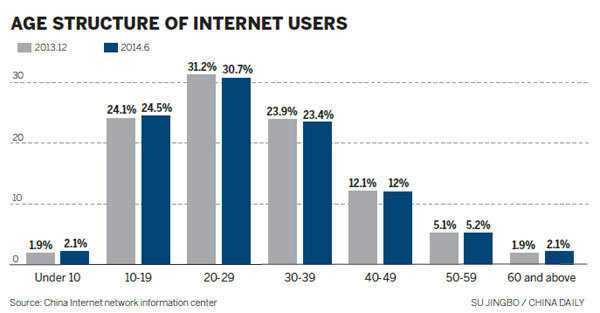Elderly sold on online shopping
After several online shopping experiences with assistance from her daughter, He is not worried about the safety of online shopping anymore. But quality is still a concern to her.
"It is too cheap to be good," he said. "Sometimes I was quite disappointed when I received the goods I bought online, as a lot of them were of bad quality. Many goods do not have the quality that their pictures show, some don't fit well, and some even don't have a label."
After a number of refund experiences, He decided to only buy from reliable brands and shops in the future, ones with good reputations.
Stories such as those from Liu and He are representative of millions of middle-aged and older Chinese, and which show the great potential of the aging in the Chinese consumption market. Yet, the market seems not to be valued, as it should be.
The Chinese marketing and consumption researchers have largely remained a vacuum for the market. It is hard to get professional and systematic reports on the elderly's consumption habits, consumer behavior and consumption trends. Information or reports that can be found either need updating or lack credibility.
Just like researchers, Chinese e-commerce websites have not paid much attention to older consumers. JD.com, dangdang.com and Amazon.cn don't have a specific category for goods for the elderly on their main pages. After keyword searching, there are only limited options available like clothes, food, healthcare appliances, etc.
Alibaba's platform Taobao.com does have a specific elderly goods category on the main page. But still, the goods in the category are not as abundant as other categories such as babycare.
Moreover, Taobao's category is not really designed for elders, but their children. The "Mum's clothes", "Dad's shoes" subdivision categories more or less show Taobao doesn't consider the middle-to older ages as their target customers.
Despite the seeming lack of commitment to middle-and senior age consumers, the Chinese market for the elderly is clearly huge and growing. The question China faces is how to improve it. Maybe its neighbor Japan, more advanced with its aging society, can be a model.
Japan has been an aging society for years. In 2013, more than a quarter of its population (31.9 million) was above 65.The specialized market is mature, with plenty of products for aging people available there.
Pan Xiaojing, a 60-year-old former Chinese diplomat who lives in Japan 15 years, thinks the Japanese society is more "elderly friendly" in many aspects. Most of products there have special mode for elderly, for instance.
Survey of internet growth in China
By the end of June 2014, the number of Internet users in China is 632 million, and mobile Internet users is 527 million.
By the end of June 2014, the proportion of mobile phones (83.4percent) as access to the Internet overtaking the traditional PC (80.9percent) for the first time, and the mobile Internet has driven the overall development of the Internet.
Meanwhile, the mobile phone's utilization ratio in mobile e-business, entertainment, information acquisition and communication applications grows rapidly, the mobile Internet has driven the development of various Internet applications.
In the first half of 2014, payment applications grew the fastest in both the entire market and the market of mobile terminal.
By the end of June 2014, the Internet users aged above 50 had accounted for 7.3 percent. The proportion rose by 0.3 percent compared with that at the end of 2013. The Internet is continuing to penetrate into the elderly population.

















